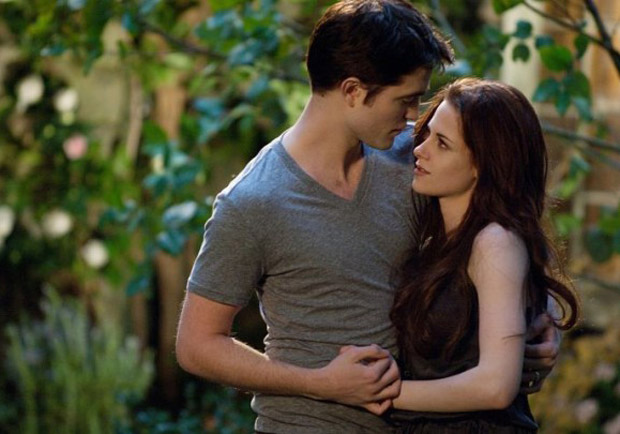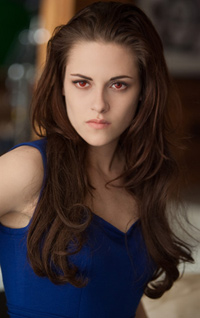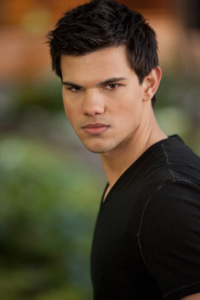About an hour into this fifth and final film of The Twilight Saga, director Bill Condon, screenwriter Melissa Rosenberg, and (most importantly) producer Stephanie Meyer have an epiphany that is about three and a half movies overdue. There are no more undecided voters. There are no more converts to be won. They could make another five movies and those who scorn the series and ridicule its fans will line up to scorn and ridicule each successive iteration. Faced with that realization they do the only sensible thing they can do; they stop trying to expand the franchise's circle of fans and start playing to the base they already have.
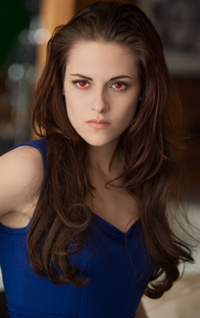
Kristen Stewart as Bella
Giving the base what it wants means, among other things, a more active and participatory Bella. Kristen Stewart may or may not be the most accomplished of the three lead actors—I certainly think she is—but Bella is unquestionably the most interesting of the principle characters simply by virtue of being the only one who is not static. Where Part I of Breaking Dawn's 2-part finale relegated Bella to sitting on a couch and being pregnant, Part II opens with Bella unleashed. She is in many ways as powerful as Edward, she has powers that are indispensable in a final battle with the Volturi (a coven of vampires out to destroy the Cullens), and she is acting as mother to protect her newborn child.
Playing to the base also means remembering, a bit late but not quite too late, that Twilight is supposed to be, first and foremost, a love story. Breaking Dawn—Part 2 manages to have its cake and eat it at the same time by deviating from the book in order to include a big, CGI battle scene but managing to do it in such a way so that the battle is neither the climax nor the violation of the books' core that fans watching the trailer might have feared it would be. The ratio of fighting to conversation is still too high, but the film does not abandon the latter altogether, and it manages to have a few nice character moments in between those building up for war.
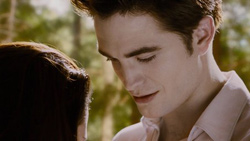
Robert Pattinson as Edward
Breaking Dawn—Part 2 still evidences many of the weakness that have plagued the franchise throughout, the chief being a mode of storytelling that tends to tell rather than show. Nearly a dozen characters are either newly introduced or reconvened, leading to lots of expository speeches about who has what power and why each character is fighting on which side. For those completely or mostly ignorant of the books, the last film is probably the most accessible simply by virtue of the fact the motivations of mother and father trying to protect their child is easily comprehensible and allows viewers who might otherwise need a score card to tell the players apart to easily separate the good vampires from the bad vampires. Even so, it takes the film a bit too long to realize that almost all of its set up is superfluous. The Twilight saga has never particularly excelled at world building—it has some big ideas but it almost always explores those ideas through character interactions rather than plot developments.
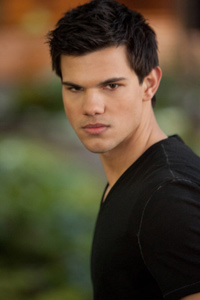
Taylor Lautner as Jacob
Nowhere is the tendency to tell rather than show more problematic and consequential than in the romance between Bella and Edward. Even for the critic who wants to judge the film on its own terms rather than simply dismissing it out of hand, it is hard to make sense out of so many of the characters' actions when one has to keep reminding oneself that "oh, yeah, it is because they are supposed to be really, passionately in love." I tend to attribute most of that difficulty in believing in the extent of the grand passion to Pattinson's rather flat and uncharismatic performance. Lautner has struck me throughout the series as the more charismatic actor and Jacob the more sympathetic character. That said, the Twilight fan and expert I saw the film with argued that Pattinson has been severely hampered throughout by a poor script in the first Twilight film that never truly explained Edward's character much less explained why Bella fell in love with him. For my friend the Twilight fanatic—and I have to think for the franchise's fans her response is more representative than my own—the finale was fully satisfying, giving fans "the moment we've been waiting for."
If you don't know what that moment is—if you are dragged to the movie by a wife, a daughter, a sister, or a girlfriend—you will probably find the film a little clunky but tolerable. If, however, you actually liked the Twilight books then go get in line right now, because Stephanie Meyer finally put her foot down and insisted that the last movie be made for you rather than for me.
Talk About It
1. Bella says she was "born to be a vampire." What does this mean? What are the implications of such an assertion for Bella's (and, hence, the film's) understanding of God?
2. Are the Cullens and their circle of allies morally superior to the Volturi? If so, what values or codes of conduct make them so?
3. Does the emotional appeal to Bella of being a vampire lie more in her being loved or being empowered? Is the vampire society truly an egalitarian one?
The Family Corner
The Twilight Saga: Breaking Dawn—Part 2 is rated PG-13 for sequences of violence including disturbing images, some sensuality and partial nudity. The sexual content is less explicit than in Part 1, but the violence is more graphic. Killing a vampire involves ripping his or her head off and burning the body, so we get to see several decapitations. One head is ripped off by holding the victim's mouth open and tearing the head at the jaw. These are some very gruesome images and that the film received a PG-13 rather than an R seems to indicate both ratings creep and a higher tolerance for violence than for sexual content at the PG-13 level. There is also some intense animal violence involving characters who are werewolves. One vampire feeds on a human victim, and this scene is regrettably played for laughs—as a means of introducing a secondary character—rather than any kind of pathos or horror. Edward and Bella are shown having sex once, though this is filmed through a moderately tame montage of extreme close ups of body parts—hands holding, backs arching, and the like. Bella speaks in graphic terms about the intensity of her physical desire for Edward and his performance as a lover. The language is explicit but not crude. Jacob (Taylor Lautner) strips to his underwear in one scene that is played for laughs but is more or less present to provide eye-candy for female viewers.

